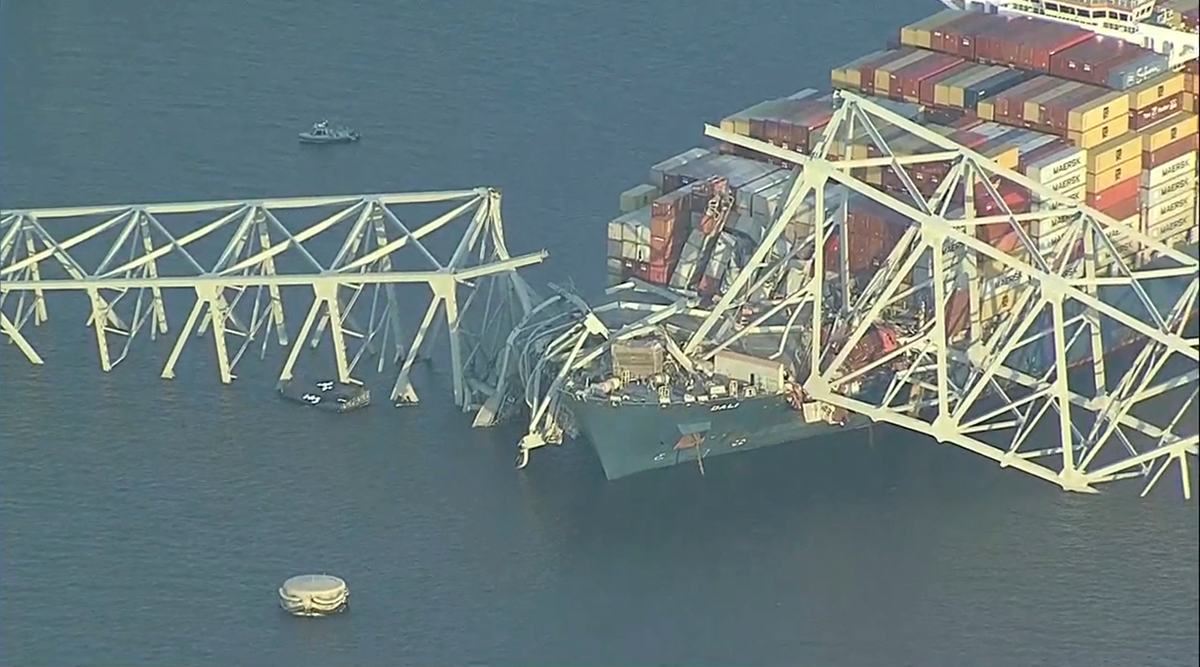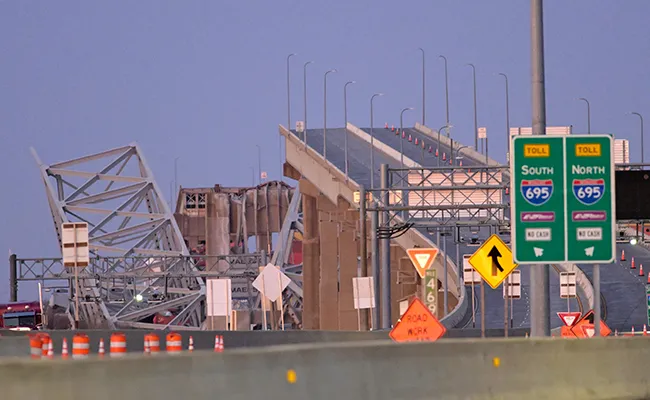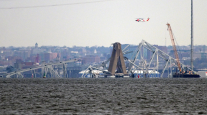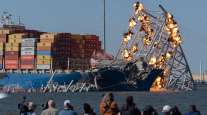Associated Press
Baltimore Bridge Collapses After Cargo Ship Rams Into It

[Stay on top of transportation news: Get TTNews in your inbox.]
BALTIMORE — A containership lost power and rammed into a major bridge in Baltimore early March 26, causing the span to buckle into the river below and plunging a construction crew and several vehicles into the dangerously cold waters. Rescuers pulled out two people, but six others were presumed dead.
The ship’s crew issued a mayday call moments before the crash took down the Francis Scott Key Bridge, enabling authorities to limit vehicle traffic on the span, Maryland’s governor said.
The Port of Baltimore said on Facebook that vessel traffic was suspended until further notice, but truck traffic was still being processed through its marine terminals.
The ship struck one of the bridge’s supports, causing the structure to collapse like a toy. It tumbled into the water in a matter of seconds — a shocking spectacle that was captured on video and posted on social media. The vessel caught fire, and thick, black smoke billowed out of it.
With the ship barreling toward the bridge at “a very, very rapid speed,” authorities had just enough time to stop cars from coming over the bridge, Maryland Gov. Wes Moore said.
“These people are heroes,” Moore said. “They saved lives last night.”
The crash happened long before the busy morning commute on the bridge that stretches 1.6 miles.
The six people still unaccounted for were part of a construction crew filling potholes on the bridge, said Paul Wiedefeld, the state’s transportation secretary.
A senior executive at the company that employed the construction workers said in the afternoon that they were presumed dead, given the water’s depth and the length of time since the crash.
Jeffrey Pritzker, executive vice president of Brawner Builders, said the crew was working in the middle of the bridge when it came apart. No bodies have been recovered.
“This was so completely unforeseen,” Pritzker said. “We don’t know what else to say. We take such great pride in safety, and we have cones and signs and lights and barriers and flaggers. But we never foresaw that the bridge would collapse.”
Rescuers pulled two people out of the water. One person was treated at a hospital and discharged hours later.
“Never would you think that you would see, physically see, the Key Bridge tumble down like that. It looked like something out of an action movie,” said Baltimore Mayor Brandon Scott, calling it “an unthinkable tragedy.”
SCARY MOMENT: Watch the moment the Francis Scott Key Bridge in Baltimore, Maryland collapsed. Authorities said at least seven people fell into the water -- one person was taken to the hospital with serious injuries. 🙏🙏
READ MORE: https://t.co/elMnlbfjk4 pic.twitter.com/7MmTnCpR41 — 7News DC (@7NewsDC) March 26, 2024
The collapse is almost sure to create a logistical nightmare for months, if not years, along the East Coast, shutting down ship traffic at the Port of Baltimore and snarling cargo and commuter traffic. East Coast ports including in New York, New Jersey and Virginia were preparing to handle additional ships if the collapse leaves terminals there inaccessible, potentially easing impacts on global trade flows.
“Losing this bridge will devastate the entire area, as well as the entire East Coast,” state Sen. Johnny Ray Salling said.
DEVELOPING: Closeup view of a ship losing power twice in Baltimore before hitting the bridge. The Francis Scott Key Bridge carries Interstate 695, and there are reports of cars in the water and the Coast Guard searching for at least 7 survivors. WATCHpic.twitter.com/Yk9SueFB1x — Simon Ateba (@simonateba) March 26, 2024
Highway signs as far south as Virginia warned drivers of delays associated with the closure of the bridge.
Authorities said sonar had detected vehicles in the water, which is about 50 feet deep. The water temperature was about 47 degrees before dawn March 26, according to a buoy that collects data for the National Oceanic and Atmospheric Administration.
The bridge came down in the middle of night when traffic would be lighter than during the day when thousands of cars traverse the span.

Parts of the Francis Scott Key Bridge remain after a containership collided with a support March 26 in Baltimore. (Steve Ruark/Associated Press)
Synergy Marine Group — which manages the ship, called the Dali — confirmed the vessel hit a pillar of the bridge at about 1:30 a.m. while in control of one or more pilots, who are local specialists who help navigate vessels safely into ports. The ship is owned by Grace Ocean Private Ltd.
It said all crew members, including the two pilots on board, were accounted for, and there were no reports of any injuries.
The ship was moving at 8 knots, roughly 9 mph, the governor said.
As the sun rose, jagged remnants of the bridge could be seen jutting up from the water’s surface. The on-ramp ended abruptly where the span once began.
Pres. Biden vows the "federal government will pay for the entire cost of reconstructing" Baltimore's Francis Key Scott bridge after its collapse.
Asked whether the shipping company should be held responsible, Biden says: "That could be, but we're not going to wait for that." pic.twitter.com/Qk7e1f1DBE — CBS News (@CBSNews) March 26, 2024
Kevin Cartwright, director of communications for the Baltimore Fire Department, said that some cargo appeared to be dangling from the bridge, which spans the Patapsco River at the entrance to a busy harbor. The river leads to the Port of Baltimore, a major hub for shipping on the East Coast. Opened in 1977, the bridge is named for the writer of “The Star-Spangled Banner.”
The governor declared a state of emergency and said he was working to get federal resources deployed. The FBI was on the scene, but said there was no credible information to suggest terrorism. President Joe Biden was briefed.
The Dali was headed from Baltimore to Colombo, Sri Lanka, and flying under a Singapore flag, according to data from Marine Traffic. The containership is about 985 feet long and about 157 feet wide, according to the website.
BREAKING: NBC News Special Report:
Maryland Governor Wes Moore speaks after Francis Scott Key Bridge collapse in Baltimore.https://t.co/A4oXpwhiSM — NBC News (@NBCNews) March 26, 2024
Danish shipping giant Maersk said it had chartered the vessel. No Maersk crew and personnel were on board.
Maersk ranks No. 5 on the Transport Topics Top 50 Global Freight Companies list.
Last year, the Port of Baltimore handled a record 52.3 million tons of foreign cargo worth $80 billion, according to the state. In addition to cargo, more than 444,000 passengers cruised out of the port in 2023.
Want more news? Listen to today's daily briefing below or go here for more info:




